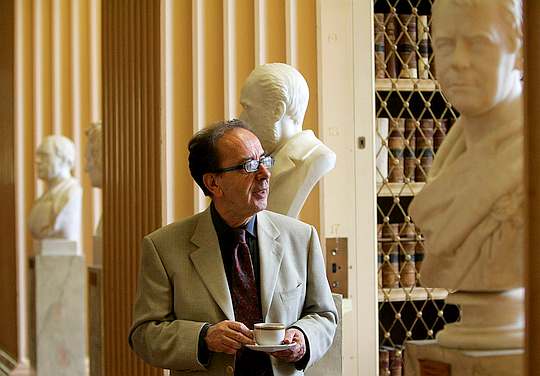- About Us
- Latest News
- Calendar
- Education
- School History
- ELA - For Toddlers
- Greek as a Second Lang.
- Greek as a Primary Lang.
- Conversational Skills (Online)
- Online Greek Courses
- Greek for Adults
- Ancient Greek
- Open Seminars
- Creative Drama
- Traditional Greek Dance
- Apply to Teach
- Holiday Program Enrolment
- Excursion - Museum
- School Polo Order Form
- Parent Notice to School
- Community Churches
- Membership
- Greek Centre
Greek Orthodox Community of Melbourne and Victoria
Event

- Title:
- Open Lecture: Greek Civilisation as a Theme of Dissidence in the Work of Ismail Kadare.
- When:
- 31.07.2014 19.00 h
- Where:
- The Ithacan Philanthropic Society - Melbourne
- Category:
- Education
Description
Presenter: Professor Peter Morgan, University of Sydney
Entry: Free
Synopsis
Albanian writer, Ismail Kadare, born in 1936, came of age with the post-war Albanian socialist dictatorship, was educated in Tirana and Moscow, and returned as a young man from the Soviet Union to his native country where he lived until the fall of the regime in 1990.
As a writer in one of the most repressive communist regimes of Eastern Europe, Kadare trod a fine line between opposition and compliance. Yet he managed to become the only voice of an alternative Albania both inside and outside his country. Greek civilisation plays an important role in Kadare’s work.
In the autobiographical novel, Chronicle in Stone, he chronicles his childhood in the town of Gjirokastra with its ethnic Greek enclaves close to the border. Later, when Kadare was learning to be a writer at the world-renowned Gorki Institute in Moscow (in 1959-60), he was taken under the wing of an older Greek communist partisan who had sought refuge in Gjirokaster after the war and subsequently moved to Moscow.
Here he viewed the unfolding of Soviet cultural politics with distance and increasing scepticism. As a writer in post-war Albania, Kadare often evokes Greece as the successful Balkan culture, which was wedded early to Europe and remained a mainstay of European civilisation, even after the collapse of the Ancient Greek city states. In the lecture I outline Kadare’s experience of Greece and Greek culture and his use of it as a foil to Albanian national history.
Biography
Professor Peter Morgan is Director of the European Studies program at the University of Sydney. Professor Morgan carries out research in and speaks German, French, Italian and some Modern Greek as well as his native English. His recent publications include Ismail Kadare: The Writer and the Dictatorship 1957-1990 (Oxford: Legenda, 2010), “Coming out in Weimar: Crisis and Homosexuality in the Weimar Republic” (Thesis 11, 2012), and “Translating the World: Literature and Re-Connection from Goethe to Gao” (Revue de Littérature comparée, 2013). Professor Morgan is currently finishing a study of the origins of German literary modernism and a second volume of the critical study of the life and works of Ismail Kadare in the post-communist context since the fall of the Albanian dictatorship is also underway.
Venue
- Venue:
- The Ithacan Philanthropic Society - Website
- Street:
- Level 2, 329 Elizabeth Street
- Postcode:
- 3000
- Suburb:
- Melbourne
- State:
- VIC
- Country:
-

In October 1916, the Ithacan migrants of Melbourne established the ITHACAN PHILANTHROPIC SOCIETY "The Ulysses", with an inaugural membership of some 153 members. This was in response to pleas for aid from their loved ones in Ithaca who were suffering deprivation during the First World War.
Over the years, however, the Society has been much more than just a philanthropic institution. It has been a constant in the lives of the early Ithacan migrants replacing the homeland which they had left.
The Society takes an active role in the cultural, social, educational and quality of life interests of the Ithacan Community. The Society, as part of its philanthropic role, also makes many monetary contributions to worthy causes, including those outside the immediate Ithacan community. The Society celebrated its 90th Anniversary in 2006.
EventList powered by schlu.net



